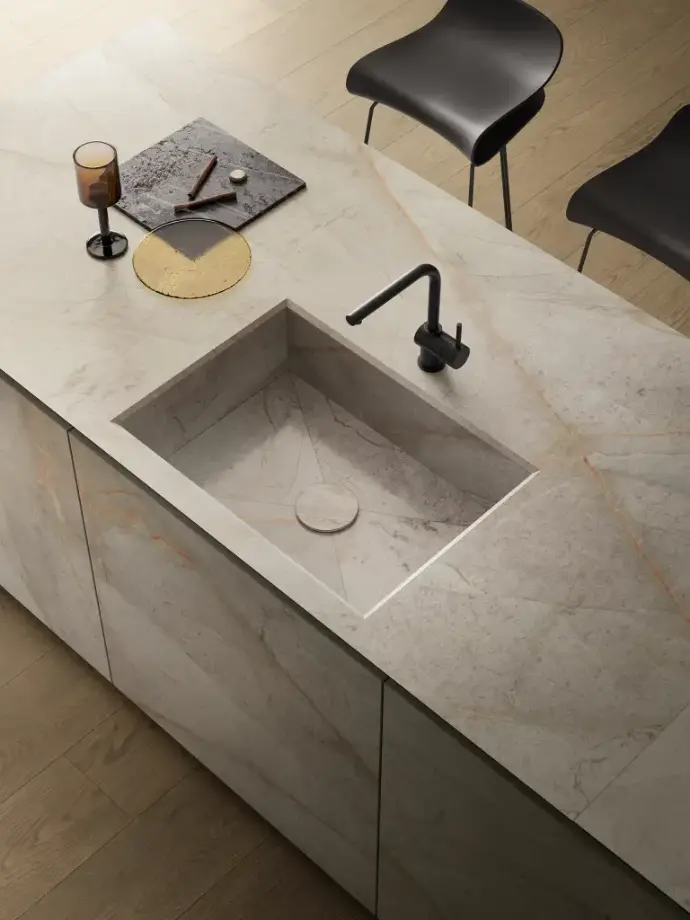Introduction
If you want your stone countertops to look great and last a long time, you’ll probably see lots of cleaning and protection products at the store. One of these is called an impregnator. But what does that mean? And should you use it on quartz or sintered stone? In this guide, we’ll break down what an impregnator is, talk about how it works, and help you figure out if your countertop really needs it. By the end, you’ll know exactly what’s best for your stone surfaces—without any confusion!
What Is an Impregnator?
An impregnator—sometimes called a penetrating sealer—is a protective chemical solution formulated to soak into the pores of natural and engineered stones, creating a barrier against liquids and stains without forming a visible film on the surface. Unlike topical sealers, which sit atop the stone and can alter its appearance or texture, impregnators work beneath the surface, leaving the original look and feel intact.
Impregnators are composed of molecules small enough to permeate microscopic voids in stone, yet large enough to bond with the substrate and repel water, oils, and contaminants. Most are either solvent-based or water-based, and may include silanes, siloxanes, fluoropolymers, or other proprietary compounds. Their primary function is to slow down the absorption of liquids, making stains less likely and cleaning easier.
Why Use an Impregnator?
Impregnators are a mainstay of stone care for materials that are naturally porous, like marble, granite, limestone, and travertine. With these stones, unprotected surfaces can quickly absorb spills, leading to deep, hard-to-remove stains—think red wine seeping into white marble, or cooking oil darkening a granite countertop. By using an impregnator, you slow down this absorption, giving yourself more time to wipe up spills before permanent damage is done.
Beyond stain prevention, impregnators can also help protect against freeze-thaw cycles, biological growth (like mould or mildew), and the gradual wear and tear of daily use. Most do not alter the stone’s natural gloss, colour, or texture, preserving its aesthetic qualities.
Quartz and Sintered Stone: Engineered Wonders
What Is Quartz?
Quartz countertops are engineered from approximately 90-95% crushed natural quartz crystals combined with resins, polymers, and pigments to form dense slabs. The result is a surface that’s non-porous, hard, and highly resistant to stains, scratches, and bacteria. Unlike natural granite or marble, quartz does not have the microscopic pores that would allow liquids to penetrate and cause damage.
What Is Sintered Stone?
Sintered stone is a next-generation material made by subjecting natural minerals (such as quartz, feldspar, and silica) to extreme heat and pressure. This process—known as sintering—transforms the minerals into a highly compact, non-porous slab. Leading brands include Neolith, Dekton, Lapitec, and others. Sintered stone is renowned for its resistance to stains, scratches, heat, UV light, and chemicals, making it suitable for both indoor and outdoor applications.
Should You Use an Impregnator on Quartz?
Given that quartz surfaces are engineered to be non-porous, the vast majority of manufacturers explicitly state that impregnators and sealers are not necessary and may even be counterproductive. Quartz does not absorb liquids or oils in the way that natural stone does; spills remain on the surface and can be cleaned with a damp cloth and mild soap.
Applying an impregnator to quartz might produce undesirable results. Some impregnators can leave a streaky or hazy residue, since they cannot penetrate the resin matrix of the slab. Additionally, using a sealer on quartz could void the manufacturer’s warranty, especially if it changes the stone’s appearance or interferes with its inherent properties. Instead, regular cleaning and prompt attention to spills are all that’s required for long-lasting quartz performance.
- Pros of Using Impregnator on Quartz: None. Quartz is naturally non-porous.
- Cons: May cause streaks or a cloudy finish; unnecessary expense; potential to void warranty.
Should You Use an Impregnator on Sintered Stone?
Sintered stone is even less porous than quartz. Thanks to the high-pressure, high-temperature manufacturing process, these surfaces are virtually impervious to moisture and stains. The dense structure of sintered stone means there are no pores for an impregnator to fill, rendering such products largely ineffective.
As with quartz, most leading sintered stone manufacturers strongly advise against using impregnators or surface sealers. Their technical manuals and care instructions recommend only gentle cleaning with neutral pH cleaners, water, and a soft cloth. Applying sealers or impregnators may not only be unnecessary, but could risk leaving residue, changing the surface sheen, or voiding warranties.
- Pros of Using Impregnator on Sintered Stone: None. Sintered stone is ultra-dense and non-porous.
- Cons: May leave unwanted residue or haze; might interfere with surface performance; could void warranty.
Common Myths and Misconceptions
It’s easy to get swept up in the marketing hype around stone care products. Many homeowners believe that all stone surfaces require sealing, or that using “extra protection” equates to better longevity. In reality, not all stones are created equal, and engineered surfaces like quartz and sintered stone have been designed to eliminate the problems that impregnators were made to solve.
Another misconception is that impregnators will add shine or enhance colour. In fact, these products are not polishes; they work invisibly beneath the surface. For quartz and sintered stone, any change in shine or colour caused by a sealer is likely to be a defect, not a benefit.
How to Care for Quartz and Sintered Stone
Instead of sealing, the best care for quartz and sintered stone is regular cleaning and mindful use:
- Wipe spills promptly with warm water and mild detergent.
- Avoid abrasive pads or harsh chemicals (like bleach or ammonia).
- Use cutting boards and trivets to protect against scratches and heat.
- Follow manufacturer’s care instructions for specific guidance.
For stubborn stains, most manufacturers suggest using a gentle cleaner formulated for quartz or sintered stone. Avoid strong acid or alkaline solutions, which might damage the surface or affect its appearance.
Conclusion: Choose Wisely
Impregnators are valuable tools for protecting natural stone surfaces prone to staining—marble, granite, and limestone, for example. However, for quartz and sintered stone, these products offer no practical benefit and may even cause problems. Trust the engineered qualities of your stone: non-porous surfaces do not need impregnation, only sensible care and cleaning.
Before using any chemical treatment, always check the manufacturer’s recommendations. If you’re unsure, reach out to the supplier or installer for expert advice. By making informed choices, you’ll ensure your surfaces remain beautiful, durable, and free of unnecessary chemicals for years to come.
Have more questions or need personalized advice for your stone surfaces? Contact us today—we’re here to help you make the best choice for your home!

